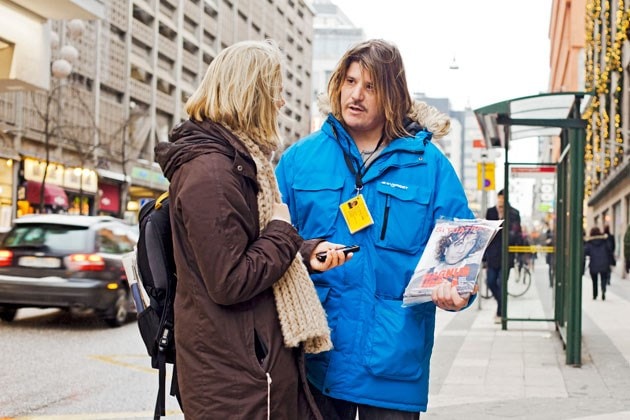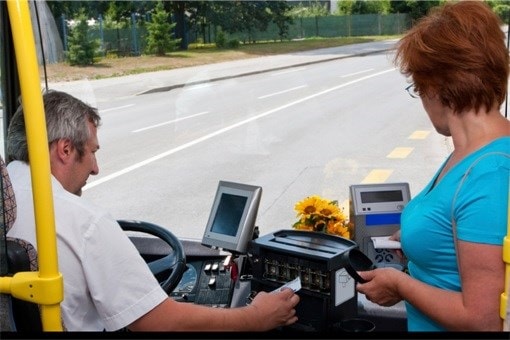Sweden - The "least money" country in the world
For Swedes, cash is gradually becoming something strange and... unnecessary because the habit of electronic payment has become so popular that even street vendors accept cards.
Sweden is now the world's most cashless country. Not only famous retailers like Big Issue but also newspaper vendors on the streets of Stockholm have installed automatic payment systems to accept cards instead of traditional cash.
 |
| Street magazine vendors in Sweden have also started accepting credit cards instead of cash. Photo: Business Week |
“More and more vendors were complaining to us that customers wanted to buy a magazine but didn’t have cash with them,” says Pia Stolt of Situation Stockholm, a magazine sold by homeless people on the streets of the capital. “It would be nice to solve this problem.” So they worked with Swedish mobile payments company iZettle to come up with a way to automate sales.
We had no idea how the machine would work or how reluctant customers would be to give their credit card information to homeless people, but the results were amazing. Sales increased by 59% after implementing the new method.”
“Swedes are very honest and trustworthy and it is a great method. In the campaign for a cashless society, Swedes were very enthusiastic and quickly adapted."
The most prominent supporter of the campaign is Björn Ulvaeus, a former member of the once-famous band Abba. After his son was robbed, he became more active, arguing that cash is the main cause of crime. “Every underground activity in the economy requires cash,” he said.
The “Money, Money, Money” songwriter has been cashless for over a year now, and the only problem is that he doesn’t have enough coins to buy things at the supermarket. The ABBA Museum in Stockholm has been cashless since May 2013. “Sweden could be the first cashless country in the world,” Ulvaeus says.
"Currently, in Sweden, 4 out of 5 transactions are made by card. In the 90s, banks and merchants were the two biggest users of payment cards. But now it has become popular and is used by many consumers," said Associate Professor of Modern Industry Niklas Arvidsson of the Royal Swedish Institute of Technology.
In London, bus riders only went cashless this year. But in Stockholm, bus travel has been ticketless for several years, ever since public transport unions declared that handling cash was an environmental issue.
 |
| Stockholm has banned the use of cash on public transport. |
"Many bus drivers have been attacked over tickets, and Stockholm has banned the use of cash on public transport," adds Associate Professor Niklas Arvidsson. "Four years ago, after a series of serious bank robberies, many banks were no longer interested in using cash in transactions. To date, five of the six major banks in Sweden, except Handelsbanken, have gone cashless wherever possible. According to the Swedish Bankers' Association, the financial sector alone has become more efficient, more cost-effective, and has seen a significant reduction in armed robberies over the past 30 years."
“People’s trust in the government and the banks will increase. Corruption will decrease. We will still feel safe even if we don’t have much cash in our hands,” said Niklas Arvidsson.
Moving towards a cashless society is part of the Better Than Cash Alliance project of the United Nations Capital Development Fund (UNCDF) with the goal of helping countries switch to electronic payment methods via Visa and MasterCard cards, invested by billionaire couple Bill Gates.
But unlike other countries, Sweden acts out of a desire and passion to pursue a modern, friendly society.
“We are leading the world’s cashless movement,” said Bengt Nilervall of the Swedish Chamber of Commerce. “The new trend is more economical and safer because printing and transporting cash is quite expensive.
Card payment technology provides many security measures for people, helping to protect people's money. Sweden is confident and ready to move towards this new trend."
However, Sweden still has to consider how to help its 1.8 million retirees out of a total population of 10 million adapt to this new trend.
“Only 50% of our members use payment cards and 7% have never used one. Therefore, we want the government to consider and implement this new method gradually,” said Johanna Hållén of the National Pensioners’ Organization.
The digital revolution in payments has also presented a challenge for tourists coming to Sweden. They will have to pre-pay for bus tickets and register their phones before entering the country. During the summer festival season in Sweden this year, many people encountered minor chaos when the payment system broke down and had to resort to the old method of debiting IOUs.
Private security expert Björn Ericsson worries that fraud could still occur. "According to figures from the Swedish National Council for Crime Prevention, fraud has doubled over the past decade," he said.
After Snowden's revelation of classified information from the US National Security Agency (NSA), Björn Ericsson still believes: "Most of Sweden's information is still on the system. I no longer hear anyone talking about Snowden and the NSA-related incidents."
“A recent survey I conducted shows that about two-thirds of Swedes think that carrying cash is a human right,” says Arvidsson. “We still have our own currency and it fits with our identity as Swedes. We are even issuing new banknotes in 2015. So even if people don’t need cash, they know that paper money exists alongside cards.”
According to Infonet






